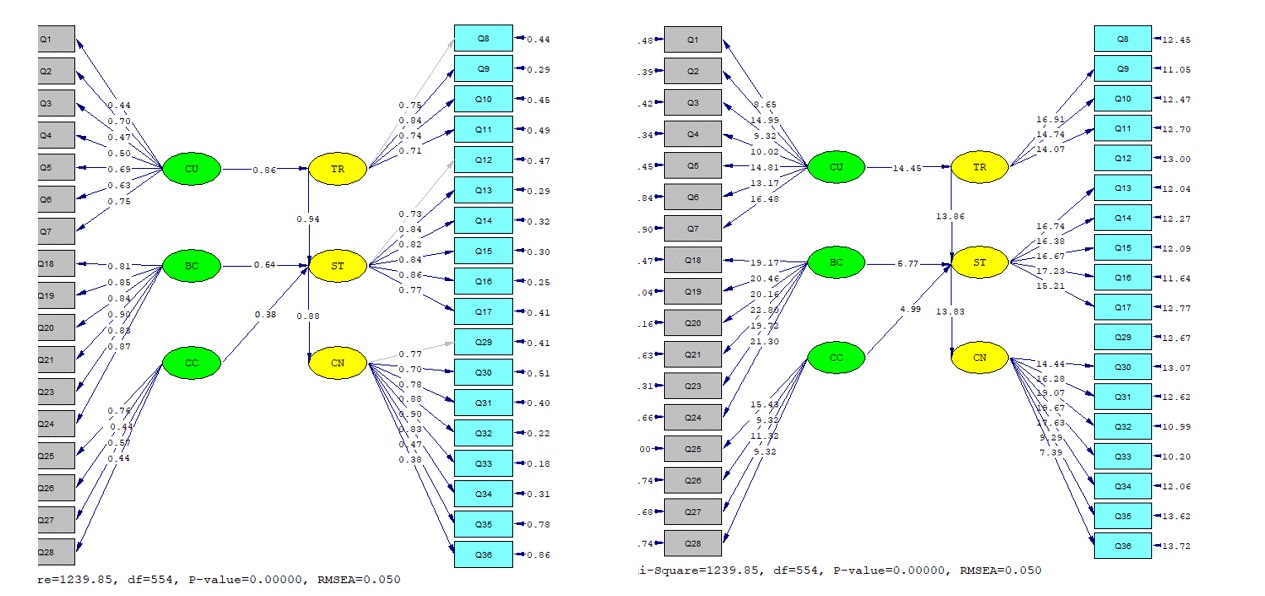Examination of Antecedents and Consequences of Innovation Commercialization in the Commercial Explosives Industry: A Mixed-Methods Approach
Keywords:
Innovation Commercialization, Commercial Explosives Industry, Grounded Theory, Structural Equation ModelingAbstract
Given the significance of the topic of commercialization and the existence of barriers to the commercialization of products and created ideas—such as financial and governmental obstacles, particularly in the field of chemicals and specifically commercial explosives—greater attention and emphasis on the commercialization process in the industries of our country is essential. The primary aim of the present study is to propose a model for the commercialization of innovations in the commercial explosives industry by considering its antecedents and consequences. This research is applied in nature and conducted using a mixed-methods approach. The qualitative section utilizes grounded theory, while the quantitative section employs structural equation modeling techniques. Data were collected through semi-structured interviews and a researcher-developed questionnaire. Theoretical sampling continued until category saturation was reached. Interviews were conducted with 10 stakeholders. The findings indicate that causal conditions influencing innovation commercialization have a significant positive impact, which include seven constructs: access to international markets, competitiveness, horizontal and vertical product development, creation of economic added value, utilization of potential capacities, technology drivers in explosives, and response to the broad demand for commercial explosive materials. Both intervening and contextual conditions have a significant impact on the formulation of strategies, which in turn lead to specific outcomes for the commercial explosives industry.
Downloads
References
Amiri, S., & Rezaee, B. (2022). The Factors Affecting the Technology Commercialization in Knowledge-Based Companies (Case Study: Kermanshah Province). Karafan Quarterly Scientific Journal, 19(2), 337-362. https://karafan.tvu.ac.ir/article_131866.html?lang=en
Bandarian, R. (2009). Marketing and Commercializing New Technologies: Steps, Facilitating Factors, and Key Success Factors. Technology Growth Quarterly(19). http://www.roshdefanavari.ir/en/Article/13930604162531811
Breschi, S., & Malerba, F. (1997). Sectoral innovation systems: technological regimes, Schumpeterian dynamics, and spatial boundaries. In Systems of Innovation: Technologies, Institutions and Organizations (pp. 130-156). https://www.taylorfrancis.com/chapters/edit/10.4324/9780203357620-7/chapter-six-sectoral-innovation-systems-technological-regimes-schumpeterian-dynamics-spatial-boundaries-stefano-breschi-franco-malerba
Cooper, R. G. (2019). The drivers of success in new-product development. Industrial Marketing Management, 76, 36-47. https://doi.org/10.1016/j.indmarman.2018.07.005
Czarnitzki, D., Hussinger, K., & Schneider, C. (2011). Commercializing academic research: the quality of faculty patenting. Industrial and Corporate Change, 20(5), 1403-1437. https://doi.org/10.1093/icc/dtr034
Dehghan Dehnavi, H., Nayebzadeh, S., & Zarrinabadi, E. (2011). Investigating Factors Affecting the Development of New Products (NPD) in the Textile Industry. Third National Conference on Textiles and Clothing, Yazd.
Edwards-Schachter, M. (2018). The nature and variety of innovation. International Journal of Innovation Studies, 2(2), 65-79. https://doi.org/10.1016/j.ijis.2018.08.004
Ghayabi, S., & Ghayabi, M. M. (2020). Markets in the Commercialization Process of Knowledge-Based Companies' Products and Examining the Role of Technology Units in Science and Technology Parks. Third International Conference on Modern Strategies in Management, Accounting, Economics, and Banking with a Business Growth Approach, Tehran.
Kahn, K. B. (2013). The PDMA handbook of new product development. Wiley. https://doi.org/10.1002/9781118466421
Karlsson, M. (2004). Commercialization of Research Results in the United States-an Overview of Federal and Academic Technology Transfer. https://www.tillvaxtanalys.se/download/18.62dd45451715a00666f1bc67/1586366161531/Commercialization%20of%20research%20results%20in%20the%20United%20States-04.pdf
Mai, Y., Zhang, W., & Wang, L. (2019). The effects of entrepreneurs’ moral awareness and ethical behavior on product innovation of new ventures. Chinese Management Studies, 13(2), 421-446. https://doi.org/10.1108/CMS-10-2017-0302
Moein, S. R., & Jalodar, Z. (2016). Creativity and Innovation and the Use of Human Resources in Increasing Productivity of Manufacturing and Industrial Organizations. Third International Symposium on Management Sciences with a Focus on Sustainable Development, Tehran.
Patience, T. H. (2024). Factors in the Commercialization of Scientific Research in Zimbabwean Universities. International Journal for Multidisciplinary Research, 6(1). https://doi.org/10.36948/ijfmr.2024.v06i01.13081
Rasmussen, E., Moen, Ø., & Gulbrandsen, M. (2006). Initiatives to promote commercialization of university knowledge. Technovation, 26(4), 518-533. https://doi.org/10.1016/j.technovation.2004.11.005
Safarzad, H., Azma, F., Saeidi, P., & Aghajani, H. (2020). Proposing a commercialization model for knowledge-based products focusing on resilient economy policies. Strategic and Macro Policies, 8(29), 3-22. https://www.jmsp.ir/article_102269.html
Toole, A. A., & Czarnitzki, D. (2010). Commercializing science: is there a university "brain drain" from academic entrepreneurship? Management Science, 56(9), 1599-1614. https://doi.org/10.1287/mnsc.1100.1192
Valderrama, T. G., Sánchez-Ortiz, J., & Mulero-Mendigorri, E. (2023). Knowledge Production And commercialization From R&D: The Pharmaceutical Sector. Management Decision, 61(13), 222-247. https://doi.org/10.1108/md-05-2022-0567
Woodfield, P. J., Ooi, Y. M., & Husted, K. (2023). Commercialisation patterns of scientific knowledge in traditional low-and medium-tech industries. Technological Forecasting and Social Change, 189, 122349. https://doi.org/10.1016/j.techfore.2023.122349











